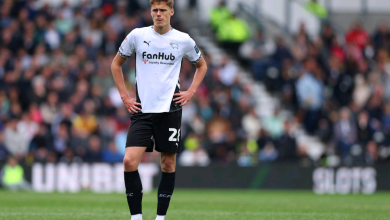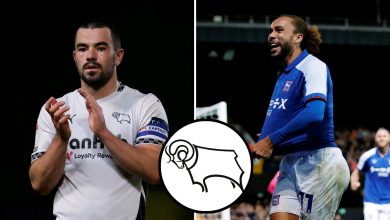‘Its A Disgrace’ – Gary Neville Exposes SHOCKING Injustice Against Derby County – Fans Furious!
Latest Derby County news from DerbyshireLive takes an in-depth look at how there is an increasing fear the likes of Derby will be left behind in the race for promotion
Now that Derby County have survived their first season back in the Championship, the prominent decision-makers at Pride Park will spend this summer devising a fresh plan of attack for what looks to be an even more competitive division.
The next pitstop in David Clowes’ long-term plan would be a comfortable mid-table position before Derby can take another stride towards their ultimate aim of challenging for a place in the Premier League.
But with money-laden Birmingham back in the Championship and an equally big-spending Wrexham making their presence felt in the transfer market, the level of competition is going to be extremely fierce.
While every team in the second tier harbours ambitions of dining at English football’s top table before a ball is even kicked, it is hard to shake the fear, however, that the Premier League is now becoming a closed shop.
Three clubs in the Championship next season will collect parachute payments, with Ipswich Town, Leicester City and Southampton pocketing nearly £50 million to cushion the financial blow of being relegated from the top flight and back into a league operating in a different world of budgets.
There will be no second-year payments due to Burnley because they are already back in the big time, Sheffield United are hoping to follow suit in the play-offs and Luton Town will cash their cheque in League One because they fell straight through. There will be no third-year payments in 2025/26 because Leicester, Southampton and Leeds United have all since won promotion and reset their calculations.
This comes as pundits have been increasingly panicking about the struggle of promoted clubs to compete in the Premier League but still being streets ahead of the Championship, in a large part due to financial rules and hugely contrasting revenues.
The parachute payment system took on its current form in 2015/16, with recently-relegated clubs getting a set percentage of the equally-shared element of the broadcasting revenue that is received by each team in the Premier League.
The amount drops progressively over three years, from 55 per cent in the first season to 45 per cent in the second and – only if the club had been in the Premier League for more than one season – 20 per cent in the third.
Non-parachute payment clubs in the Championship receive 11 per cent of the first-year deal in what is called a solidarity payment.
It was a basic £86.9m per Premier League club for domestic and international TV rights in 2023/24 –clubs then got more through facility fees depending how many times they were shown – which meant relegated clubs in their first year down got a cheque for £47.8m, second year got £39m and third year got £17.4m. Other Championship clubs received £5.3m.
The EFL has been making the case against parachute payments, claiming they are widening the gap between the haves and have nots and advocating a redistribution of finances based on merit.
But the Premier League has been sticking to its guns and insisted it is the best way to manage the gaping chasm between the two divisions.
The situation is heightened for clubs in the Championship like Stoke City because profit and sustainability rules limit owner investment – in brief, to about £13m per season – to way below the money handed out in parachutes. Stoke have been among those lobbying for changes.
What the EFL say
EFL chairman Rick Parry told StokeonTrentLive recently: “Our starting point was to say that the big challenge for everyone in the Premier League and the Championship is the cliff edge between the two divisions, which is in excess of £100m. It’s a challenge for the teams coming up and coming down, which is ostensibly why you need a parachute.
“Our proposal for revenue sharing – the 75-25 formula and introduction of steeper merit rates within the Premier League and the Championship – would have halved the cliff edge to £50m. Our position has been that if you halve the cliff edge, why do you need a parachute? If we solve the issue systemically and properly there wouldn’t be a need for a parachute.
“Having said that, we don’t want clubs to go bust when they come down. That’s not the objective. We’re not going into the debate saying parachutes can be zero – we think they are way too high at the moment. It’s really interesting that if you look at the German system, they split the media revenues 80-20. You can’t even define what the split for media revenues is here. There isn’t a fixed percentage because it all flows from the parachute payments.
“Parachute clubs’ year one payments is very nearly £50m, other Championship clubs get 11 per cent of that. They get just over £5m. You can’t say that the EFL get X because it depends on how many parachute clubs there are, it could be between four and nine, which is a pretty barmy system in itself.
“We say we’ve got to have a complete rethink on it and instead of it being in the gift of the Premier League, deciding what they are going to pay relegated clubs, we should have an impact on that debate. We’re not saying they have to be abolished, we don’t want relegated clubs to go bust but we do have to address the sustainability of clubs at every level and setting a priority of clubs being able to rise and fall safely.
“We’re not dogmatic and we’re not saying that the Labour Bill should abolish parachute payments, it doesn’t. The problem with the Conservative Bill was that it said that the regulator couldn’t even consider parachute payments. The point we made was that it was making the Bill pointless because in 2021 as an example year, parachute clubs received £233m and the other clubs in the Championship, the other 19, received £79m.
“Effectively, the (football governance) Bill could address £79m but not £233m, which seemed to us to be utterly pointless. Fortunately Labour have taken that on board but it’s not abolishing parachute payments, but as part of a total economic study, parachutes will be looked at alongside all the other distributions and hopefully we’ll come up with a fairer system.”
What Premier League opponents say
West Ham United vice-chairwoman Karren Brady said earlier this season: “What they don’t seem to understand in government is that parachute payments, if they didn’t exist, would have to be invented.
“Ninety percent of administrations in football happen during a relegation event. So, without a parachute payment, you can’t compete when you get up and you can’t cope when you go down.
“The thought that a regulator could damage that or upset that balance would really affect the competitiveness of the Premier League and there doesn’t seem to be any clarity over why they can make that decision or how they make that decision.”
What pundits say
Gary Neville said recently on The Overlap: “There’s a football question (about why teams are going straight back down) but there is also the financial disparity between what’s happening in the Championship and Premier League and we’ve talked about this for years.”
He added: “It’s got to the point now where clubs who come up – Nottingham Forest spent a hundred-odd million pounds – you have those wages when you sink back. There are some levels to soften the impact but the risks you have to take to stay in mean that if you go back down with a parachute there is still a risk of going under financially.
“You’re frightened then to go for the risk. What you’re seeing now is teams coming up and thinking, ‘There’s no point in going for it that much, we’ll try to outperform it and then at least we’re not going under financially.’
“It’s getting to a point where the gap is getting bigger.”
Ian Wright said: “We should be absolutely worried (about promoted teams going straight back down). There are 17 teams in that are continually getting money because three teams are coming in, whether it’s Leeds, Sheffield United or Burnley or whoever, and then they go again.
“These 17 teams are continually getting stronger, the middle teams even. Look where Villa are now. Look at Brighton, look at Fulham having a go, Brentford, Bournemouth. All these teams are getting so much better than the three teams who are coming up.”
He added: “You look at Wolves this season. They have been so bad this season but they have had nothing to worry about.”
What football finance experts say
Kieran Maguire told a parliamentary committee: “The intention of parachute payments when they were introduced, which was around 2006, was to address the possibility of clubs going into administration, because of the significant step-downs between the Premier League and the Championship.
“At the same time, it does mean that you have created a new benchmark in levels of spending that clubs in receipt of parachute payments can achieve, and therefore those clubs in the Championship that want to be competitive are incentivised to overspend, so I think we have a problem.
“Parachute payments are a clumsy solution to the bigger problem, which is the significant difference between the revenues of not just the Premier League and the Championship, but also between the Championship and League One.”





